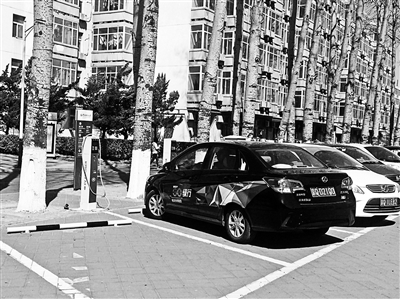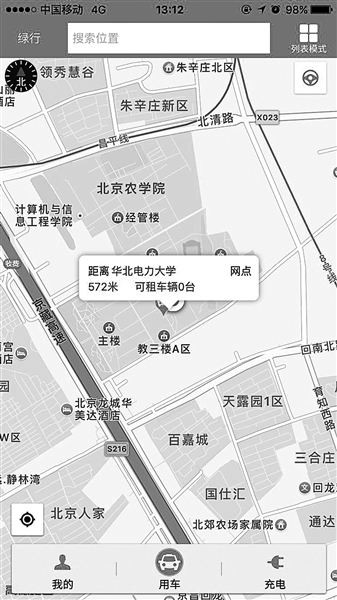New energy vehicles enter colleges and universities for 159 yuan a day, and students rent cars for a ride.


Recently, North China Electric Power University cooperated with BAIC Huge Group to open a self-service time-sharing rental point for new energy vehicles on campus. Many students lamented that "only schools have rented bicycles, but no schools have rented cars". How is this seemingly "fashionable" consumption pattern developing on campus? Can college students who have no independent economic ability afford it, and can new energy vehicles be promoted in other universities? With these questions, the Beijing Youth Daily reporter launched a visit.
status
Students can’t rent a car in the afternoon.
Recently, the reporter of Beiqing Daily came to North China Electric Power University to find out. The school’s new energy vehicle rental point is set on the four sides of the school, with a row of charging piles next to it. Teachers and students can rent a car by downloading the "Green Business Car" APP on their mobile phones, and there are also staff on the spot to provide car rental guidance. The reporter of Beiqing Daily observed at the scene that within half an hour from 2: 30 to 3: 00, three cars were rented out. At 3: 00, there were only three cars left at the scene. On the "Green Business Car" APP page, "0 Available Vehicles" is displayed, because all three vehicles are charging due to insufficient power.
On March 9 this year, North China Electric Power University cooperated with BAIC Huge Group to open a self-service time-sharing rental point for new energy vehicles in the school, and built 5 fast-filling piles and 29 slow-filling piles in the school, putting 20 vehicles into operation. Regarding the reasons for introducing new energy vehicles in the school, the school said at the official website, "Under the new situation of bus reform, the landing of this project will help to improve work efficiency, meet the needs of school official activities, and also provide service guarantee for teachers and students of our school."
However, compared with the teachers in the school, almost all the customers who rent cars are college students. A counselor of the school said, "As far as I know, there are not many teachers renting cars around me. It is not cost-effective for teachers to rent a car to go home, and they can’t ensure the electricity."
At the car rental scene, the reporter of Beiqing Daily saw that most of the students organized a car rental. There are five students sitting in a car, and the girl sitting in the main driver’s seat introduces that everyone is a classmate in the laboratory and meets to drive around the school. The girl said: "We are graduates of Grade Three, and we want to try the feeling of driving out to play before graduation."
Renting new energy vehicles is a "high consumption" for college students. What about the market in colleges and universities? The car rental girl interviewed randomly by the reporter said, "We rent a car in a group, and rent it for 159 yuan a day, and divide it equally between each talent and 30 yuan. However, if you rent a car yourself, it is not as cost-effective as public transportation. "
Regarding the introduction of new energy vehicles into the campus, a teacher who works as a student in the school said, "Now the consumption concept of college students is very different, especially some students spend money to rent a car and take their girlfriends for a ride, which is still relatively ‘ Cool ’ Yes. "
survey
It remains to be seen whether the leasing of new energy vehicles can be promoted.
The reporter of Beiqing Daily learned from Beiqi Huge Co., Ltd. that the company will be officially launched in North China Electric Power University, and will be promoted in dozens of universities such as China Renmin University, Beijing Institute of Technology and Beijing Forestry University, with plans to cover all universities in Beijing. However, there are also some different voices in colleges and universities about the issue of new energy vehicles entering the campus.
Novice car rental on the road
Increase the hidden danger of campus traffic safety
According to relevant surveys, the proportion of students with driver’s licenses in colleges and universities is about 70%, and most of them get their driver’s licenses during their college years. However, some students are not skilled enough in driving skills because they usually have few opportunities to drive. After new energy vehicles enter the campus, students can rent a car by uploading their driver’s license when registering for the APP, which brings some hidden dangers of campus traffic safety.
"Since our school has a new energy vehicle rental project, I have been much more careful in driving at school." A teacher Liu, who teaches at the school, said, "Recently, I have seen several students sitting in a new energy vehicle. You can tell by the driving posture of the students in the main driver’s seat that they are novices, and the car is driving very slowly. This student will not rent a car to practice driving." Therefore, since then, when Mr. Liu saw new energy vehicles and students-like drivers while driving in the school, he would choose to avoid or slow down.
Another thing that worries Teacher Liu is what to do if students with poor driving skills drive outside the school. "The traffic outside the school is definitely more complicated than that inside the school, especially the safety of students with poor driving skills is difficult to be guaranteed."
Students have no financial ability.
The market prospect remains to be seen.
In the interview, the reporter of Beiqing Daily found that most of the car rental groups are graduate students with a little stronger economic ability, and most of them are "scraping rent" to go out to play. Even if it is "rent-sharing", will these students rent cars frequently? After the "early adopters", will the school’s new energy car rental project cool down?
According to the questionnaire survey of North China Electric Power University students’ attitudes towards self-service leasing of new energy vehicles initiated by a student in this school (276 people filled in the questionnaire), nearly 50% of the students’ living expenses are between 1,000 and 1,500 yuan, and only 10% of the students’ living expenses are above 2,000 yuan. Among them, 39.13% of the students think that the living expenses are just enough, and nearly half of them can only afford to rent a car within 100 yuan. A junior student whose monthly living expenses are about 1,500 yuan said, "My monthly living expenses are just enough. Last time I rented a car with my classmates, I spent 50 to 60 yuan. Occasionally, I just went out to play a few times like this. If I have more, I can’t bear it."
Under the option of "under what circumstances would you choose to rent a new energy vehicle", nearly 30% of the students chose "out of curiosity", nearly 60% chose "friends go out to play together" and only 10% chose "going out to do things" and other purposes. In terms of "how many people to rent a new energy vehicle together", 66.67% of the students choose "two or more people to rent a car". "Who has nothing to do? A person spends more than 100 yuan to rent a car and go out for a stroll." A graduate student who rented a car said that it is enough to experience the freshness at the beginning, and then consider whether to rent a car when there is demand in the future.
memory
High consumer goods in universities in different times
In different times, high-end consumer goods and consumption patterns popular in universities are different. In this regard, the reporter of Beiqing Daily combed the high-end consumer goods that were fashionable in universities during the decade from 2005 to 2015. Although the fashionable high-end consumer goods in universities are constantly changing in the past 10 years, some expensive goods are still the blind pursuit of some college students.
Time: 2005-2009
High consumer goods in universities: Sony single player, MP3/4, PSP, Nokia and other brands of mobile phones.
At the beginning of 2000, Sony single player, MP3/4, PSP and other electronic products became popular on university campuses, which was a high consumption for college students.
When Zheng Fei, who went to college in 2005, entered the school, his family rewarded a Sony single player with a price of 300 yuan or 400 yuan. "The single player is very thin, and it can attract the attention of some students when you put a tape in." In addition, it’s good for college students to own a Nokia phone with 700 yuan or 800 yuan. If someone buys a Motorola flip phone or a Sony phone, it’s equivalent to owning a luxury.
Time: 2009-2013
High consumer goods in universities: digital products such as notebook computers, smart phones and SLR cameras.
On the university campus, high-end consumer goods are often owned by individuals at first, and finally become something that most people will own. Taking mobile phones as an example, it would be very good to have a Nokia mobile phone around 2005. However, with the development of mobile phone technology, smart phones began to become popular around 2009, and college students’ demand for mobile phones was upgraded to touch-screen smart phones with Internet access.
Sun Bo entered school in 2009. In 2010, when people around him began to change their smartphones, Sun Bo began to "itch". "My mobile phone can only play QQ, and I am envious of watching my classmates play Weibo with their smartphones." At that time, the price of smart phones was not low, at least 2,000 yuan. After many requests with his family, Sun Bo bought an HTC smartphone for 2800 yuan. "At that time, only one person in our class had an Apple mobile phone, which was something that many people dared not think about."
Time: 2013- present
College high-end consumer goods: Apple three-piece suit (iPhone, iPad, Mac), luxury goods such as bags and shoes, cosmetics, and traveling abroad.
In recent years, every time a college freshman enters school, there is news in the media that "there are freshmen who have to complete the three-piece Apple before entering school". For Deng Chang, a sophomore with better economic conditions at home, the "three-piece Apple set" has already been completed. "I had an iPhone and iPad when I was in my third year of high school, but I bought an Apple computer when I was in college." Besides, Deng Chang spent four days in Thailand with several classmates last summer vacation, and spent nearly 10,000 yuan.
expert
Self-worth does not depend on high consumption.
In recent years, some different consumption patterns have often emerged in colleges and universities, leading the consumption "trend" of colleges and universities. However, in addition to experiencing some new consumption patterns, some college students blindly pursue high consumption that is inconsistent with their own abilities.
Wang Jianping, a professor at the School of Psychology of Beijing Normal University, believes that college students are born after 1995, which is too different from people’s traditional impression of college students, so that people often don’t understand some of their practices. "Most of them are only children, and their family conditions are good. It is no problem to pursue a better life." Wang Jianping said, "However, some students blindly pursue high consumption that has nothing to do with study and life, thinking that buying some high-priced goods can reflect their self-worth and be accepted and recognized by the group. This has problems."
Wang Jianping suggested that colleges and universities should help students establish a correct consumption concept and values, and don’t let students think that they can reflect their self-worth by relying on some precious commodities.
Text/reporter Li Mengting Intern Qi Minqian Photography/reporter Li Mengting